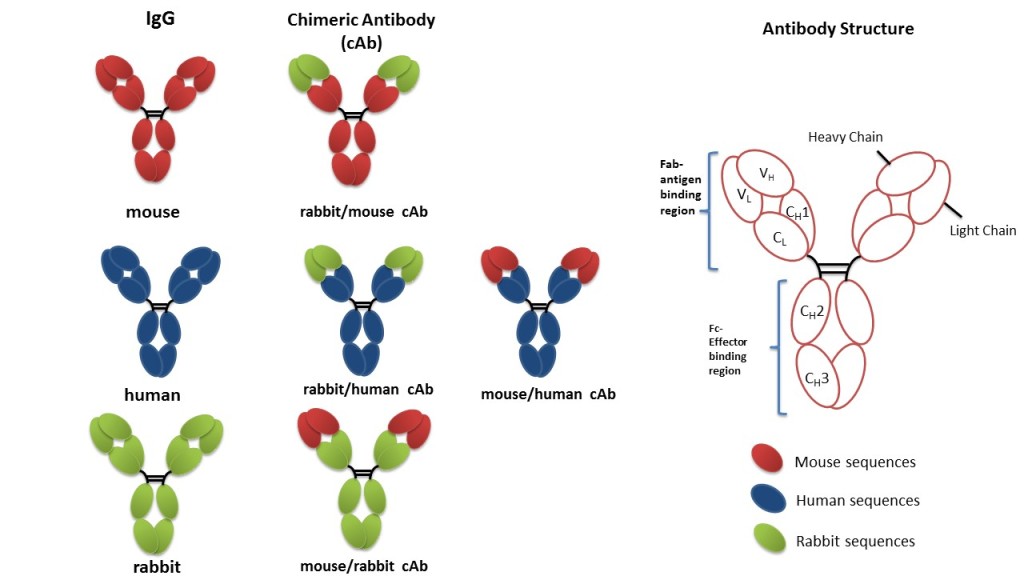Chimeric antibodies consist of an antibody’s original antigen-binding variable domains with the constant domains from a different species. At Absolute Antibody, we offer an antibody chimerization service for almost any mammalian species, in particular human, mouse, rat, rabbit and hamster IgG with other species and isotypes available on request.
Chimeric antibodies retain the original antibody’s antigen specificity and affinity and are valuable tools for in vivo and in vitro research, as well as diagnostic assay development.

In Vivo Research
- Biotherapeutic research
Many therapeutic monoclonal antibodies were originally generated in mice and chimerized to reduce immunogenicity in humans, before humanization was widely adopted. Examples of chimeric antibodies in the clinic include infliximab, rituximab and abciximab. Chimeric antibodies containing human constant domains and mouse variable domains are substantially cheaper than fully humanized antibodies. This makes them useful at the early stages of biotherapeutics research.
Example products: our research-grade biosimilars, available with human, mouse, rabbit, rhesus monkey and cynomolgus monkey constant domains - Improved in vivo performance
Species-matched chimeric antibodies reduce anti-species immune responses in animal models. Quite often antibodies may be generated in one species, for example rat, and the disease animal model being used may be another, for example mouse. Here, a chimeric antibody with mouse constant regions (partially “murinized”) will result in reduced immunogenicity. For example, this case study illustrates how a species-matched, mouse-anti-mouse antibody was able to deplete CD8+ T-cells in mice more completely and for longer than the traditional rat monoclonal.
Example products: our immunotherapy antibodies, all available in mouse-anti-mouse format
In Vitro Research
- Chimerization allows antibodies to be tailored to specific applications, as they are not limited to the original antibody species. Chimeric antibodies therefore give researchers the flexibility to adapt the monoclonal antibody of their choice to any platform or binding module/surface. In flow cytometry and IHC applications, for example, chimeric antibodies can circumvent potential non-specific binding issues associated with binding of secondary antibodies to the test cell or tissue. For immunofluorescence applications, chimeric antibodies can enable easier co-labelling studies.
Example products: we have generated a family of anti-myc tag antibodies for use as controls or affinity capture antibodies. The original anti-c-myc antibody [9E10] is a mouse monoclonal; it is now available off-the-shelf with human, rat, rabbit, goat or hamster constant domains.
Diagnostic Assay Development
- Use as serological controls in immunoassays
Serological immunoassays designed to detect a specific antibody in patient samples rely on serum calibrators (standards) and/or positive controls. Calibrators are used to generate standard curves to quantify the test antibody concentration in the patient serum, or as positive controls to assess the performance of the assay and reagents. For a serological assay, calibrators are derived from seropositive serum or plasma and are heterogeneous by nature. As a result, they suffer from significant drawbacks, including lot-to-lot variability, sourcing difficulties, and characterization limitations.
Recombinant chimeric antibodies are a more reliable alternative to serum-based calibrators. Advantages include batch-to-batch reproducibility, homogeneous specificity and affinity, and the ability to generate fully characterized antibodies in unlimited quantities.
Example products: our IgE Fc Proteins, used to create reproducible control sera by spiking the IgE into normal sera, are available in species such as human, mouse, dog, cat and horse. - Reduce interference from heterophilic antibodies
Heterophilic antibodies, poly-reactive antibodies recognizing IgG from different animal species, are found in human patient serum and plasma. These antibodies are non-specific, have no defined antigen, and can bind to the Fc region of the assay antibody, causing a false positive test signal. Heterophilic antibodies found in patient serum react with rat and mouse IgG (often called human anti-mouse antibodies or HAMA). Since conventional high affinity monoclonal antibodies are only obtained from mice and rats, heterophilic antibodies can be a limitation in diagnostic tests. Human chimeric antibodies are a solution to this problem.
Example products: we offer various anti-allergen antibodies of interest to diagnostic assay developers, available with human constant domains.
Interested in chimeric antibodies? Our recombinant antibody catalog includes products in a wide range of species, or we can convert any antibody into any species upon request – contact us to get started!

 United Kingdom (UK)
United Kingdom (UK)